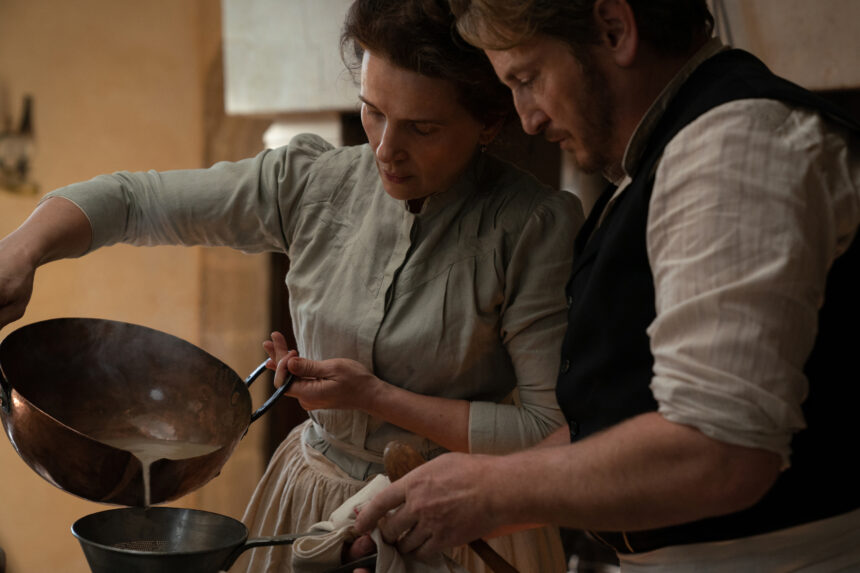The Taste of Things
⭐️ ⭐️ ⭐️ ⭐️
Rating: PG-13
Run Time: 2 hours 15 minutes
Stars: Juliette Binoche, Benoît Magimel
Writers: Marcel Rouff, Trần Anh Hùng
Director: Trần Anh Hùng
The credits claim The Taste of Things stars Juliette Binoche and Benoît Magimel—which is an outrage, because the pair are in many ways supporting players to the main attractions: A sizzling coq au vin, a wide-eyed turbot in hollandaise sauce, and a blazing-on-the outside, frozen-on-the-inside baked Alaska, to name just a few.
They should call their agents.
Indeed, of the film’s 175 minutes, it’s no exaggeration to say at least half of that time, and probably more, is spent in the so-close-you-can-smell-it environs of cast metal skillets, copper pots, and wood-fired ovens yielding wonders of French cuisine that would make Jacques Pépin très jaloux.
Which is, in the end, the point of this exquisitely photographed, lovingly mounted story of Dodin Bouffant (The Piano Teacher’s Benoît Magimel)–an 1880s Paris bon vivant known to all of France as “The Napoleon of the culinary arts”—and his brilliant chef Eugénie (Juliette Binoche). The two have been perfecting recipes together for 30 years—and not all the cooking goes on in the kitchen. Dodin has been begging Eugénie to marry him for years, but she’s a fiercely independent woman who, as she explains to Dodin, likes the idea of being able to lock her bedroom door when she feels like it.
That attitude shifts somewhat when a health crisis arises, and the manner in which the pair work out their problem—with a gloriously prepared meal as its natural center—elevates The Taste of Things from mere filmatic food fest to a genuinely absorbing human drama.
Still, let’s not kid ourselves: The Taste of Things is a worthy successor—and in some ways a superior one—to gastroclassics like Babette’s Feast, Like Water For Chocolate and Big Night. Under the off-camera direction of leading French chef Michel Nave, Binoche and Magimel conjure up their dishes before our eyes, in real time. For, no kidding, 30, minutes, Binoche’s Eugénie hauls pots, pans, and trays groaning with fish, veal, and veggies. She seasons, she pinches, she pours bottles of wine over her creations. She tenderly ladles a thick seafood-and-vegetable stew into a hollowed-out puff pastry.
Occasionally, director co/writer Trần Anh Hùng cuts away from Eugénie’s toils, switching to the upstairs dining room where Dodin and a half-dozen buddies, connoisseurs all, do nothing but rave about the repast put before them, reveling in their ability to decipher even the most minute ingredients.
At first, we sort of resent these guys nibbling away at Eugénie’s handiwork while she diligently prepares the countless courses—but when they venture to the kitchen to thank her, we learn they’ve been inviting her to join them at these regular repasts for years.
“I converse with you in the dining room through what you eat,” she responds. “I inhaled the turbot’s scent. I turned it, stroked it, every moment it was in this kitchen. I know by heart its color, its texture, and even its taste without taking a bite.
“So this turbot did not give you more than I received.”
The Taste of Things is infused with moments like that; solemn, almost reverential, appreciations for not just the necessity of food, but the glory of it—and those who take the time to bask in it.
Some writers are warning audiences not to see The Taste of Things on an empty stomach. I disagree: Allow its wonders to set your stomach growling; then head out for a good meal.
And remember to thank the chef.
Become a Saturday Evening Post member and enjoy unlimited access. Subscribe now




Comments
I think I will enjoy this film, and will be moved to view again Juliette’s other craving inducing triumph, Chocolat. Just not during Lent!